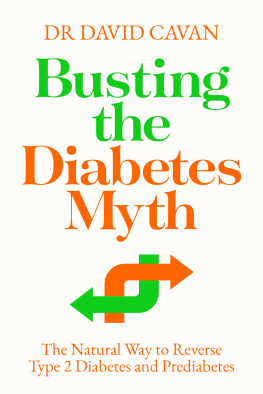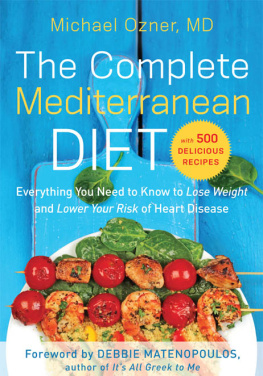Conquer Diabetes and Prediabetes:
The Low-Carb Mediterranean Diet
By Steve Parker, M.D.
Smashwords Edition
Copyright 2011 Steve Parker
This book is available in print at mostonline retailers.
Smashwords Edition License Notes
This ebook is licensed for your personal enjoyment only. This ebookmay not be re-sold or given away to other people. If you would liketo share this book with another person, please purchase anadditional copy for each recipient. If youre reading this book anddid not purchase it, or it was not purchased for your use only,then please return to Smashwords.com and purchase your own copy.Thank you for respecting the hard work of this author.
CONTENTS
Disclaimer
Dedication
Disclaimer
The ideas and suggestions in this book areprovided as general educational information only and should not beconstrued as medical advice or care. All matters regarding yourhealth require supervision by a personal physician of otherappropriate health professional familiar with your current healthstatus. Always consult your personal physician before making anydietary, medication, or exercise changes. The publisher and authordisclaim any liability or warranties of any kind arising directlyor indirectly from the use of this book. If any problems develop,always consult your personal physician. Only your physician canprovide you medical advice.
Dedication
To my mother, Jean Murray Parker, and to thememory of my father, Allan Edward Parker (1927-2009)
*****
Im sorry for what the medical establishment hasdone to people with diabetes.
Weve done an atrocious job for type 2 diabeticsand prediabetics.
Weve recommended they eat precisely what theirbodies cant handle: carbohydrates. Weve urged them to takepoison: carbohydrates. Weve cooperated with the drug companies toencourage diabetics to eat foods that increase drug companyprofits: carbohydrates.
Much of the medical establishments damage todiabetics has been done innocently, unknowingly. Rank and filephysicians, dietitians, and nutritionists put blind faith in theirinstructors, scientific journal editors, and time-honored andtenured "thought leaders." Our unquestioning faith has hurt peoplewith diabetes and prediabetes.
"But, Dr. Parker, youre too hard on doctors.Dietitians are the ones who tell diabetics what they shouldeat."
True, dietitians do an awful lot of dietaryinstruction. But physicians have much more training in chemistry,biochemistry, physiology, and disease processes. Doctors shouldhave figured out long ago that standard diabetic diet advice wastoxic. A few pioneering physicians indeed figured it out longbefore me. In chronological order, a few of the leaders are JohnRollo (1797), Richard K. Bernstein, Richard C. Atkins, Mary C.Vernon, Michael R. Eades, Mary Dan Eades, and Eric Westman.Compared to the mainstream medical establishment, these doctorshave had - unfortunately - insufficient influence among theircolleagues.
Other physicians pioneeredcarbohydrate-restricted weight loss programs not necessarilyfocused on diabetes. Prominent names are Jean-Franois Dancel(French physician and surgeon, 1844), William Harvey (London,1850s), Thomas Tanner (England, 1869), Frank Evans (Pittsburg,1940s), Blake Donaldson (New York cardiologist, 1919), and AlfredPennington (Delaware, 1940s)
For over two decades, Ive been part of theproblem, the mainstream medical establishment. But evidenceaccumulated over the last 10 years forces me to renounce my oldways. The scientific evidence, at first a trickle but now atsunami, points to carbohydrate restriction as the best dietaryapproach to diabetes and prediabetes. Major carbohydraterestriction.
But set aside diabetes for a moment.
Ive long been an advocate of the Mediterraneandiet for the general population. Its well established thatMediterranean-style eating prolongs life and reduces the rates ofnumerous illnesses: heart attacks, strokes, cancer, dementia, andtype 2 diabetes, for example.
Its also well established that having diabetestends to shorten lifespan and promote heart attacks, strokes, anddementia. Several cancers are linked to diabetes: liver, pancreas,uterus, colon, breast, and bladder. The Mediterranean diet,remember, counteracts these scary trends. Why not combinecarbohydrate restriction and the Mediterranean diet? Youre aboutto see the worlds first publically available eating plan that doesjust that: the Low-Carb Mediterranean Diet.
The most earth-shaking development in the fieldof nutrition over the last half century is the discovery that totalfat and saturated fat in the diet are not particularly dangerous -if at all - for the vast majority of people. (For supportingdocumentation, see the Annotated Bibliography at the end of thebook, orhttp://advancedmediterraneandiet.com/blog/2009/07/06/are-saturated-fats-really-all-that-bad/.)
Carbohydrate-restricted diets have the potentialto be relatively high in total and saturated fats. Until recently,total fat and saturated fat were thought to cause or contribute toatherosclerosis - hardening of the arteries - in turn leading toheart attacks, strokes, peripheral artery disease, and prematuredeath. Now that we know this theory is wrong,carbohydrate-restricted diets for weight management are inresurgence.
If you find out youre being poisoned, whatsthe first thing you do? Stop taking the poison, right? In thiscase, the poison is carbohydrates.
Ive created a carbohydrate-restricted eatingprogram that helps control diabetes. It helps resolve prediabetesor prevents progression to full-blown diabetes. It also reversesmetabolic syndrome.
Yes, for too long the medical establishment haslet down the diabetes community. This book is an effort to setthings right.
*****
Type 2 diabetes and prediabetes are epidemicsbecause of excessive consumption of refined sugars and starches,and lack of physical activity.
SCOPE OF THE PROBLEM
Diabetes is the most important public healthproblem in the U.S. and most of the developed world. The U.S.Centers for Disease Control and Prevention predicts that one ofevery three Americans born in the year 2000 will developdiabetes.
The most common form of diabetes by far is type2, which describes at least 85% of cases. Its less serious thantype 1 diabetes. Type 1 diabetics have an immune system abnormalitythat destroys the pancreass ability to make insulin. Type 1s willnot last long without insulin injections. On the other hand, manytype 2 diabetics live well without insulin shots.
The epidemic of diabetes in the U.S. and thedeveloped world overwhelmingly involves type 2, not type 1. Thefocus of this book is type 2 diabetes and prediabetes.
"Prediabetes" is what youd expect: a precursorthat may become full-blown diabetes over time. Blood sugar levelsare above average, but not yet into the diabetic range. One in fourpeople with prediabetes develops type 2 diabetes over the course ofthree to five years. Researchers estimate that 30% of the adultU.S. population had prediabetes in 2006. Thats one out of everythree adults. Only 7% of them (less than one in 10) were aware theyhad it.
The rise of diabetes parallels the increase inoverweight and obesity, which in turn mirrors the prominence ofrefined sugars and starches throughout our food supply. Thesetrends are intimately related. Public health authorities 40 yearsago convinced us to cut down our fat consumption in a mistakeneffort to help our hearts. We replaced fats with body-fatteningcarbohydrates that test the limits of our pancreas to handle them.Diabetics and prediabetics fail that test.
Dr. Richard K. Bernstein, notable diabetologist,wrote that, "Americans are fat largely because of sugar, starches,and other high-carbohydrate foods."
In the U.S. as of 2008, 24 million adults havediabetes. Thats 11% of all adults and 23% of those over 60.Another 57 million in the U.S. have prediabetes: one out of everythree adults.
Next page







